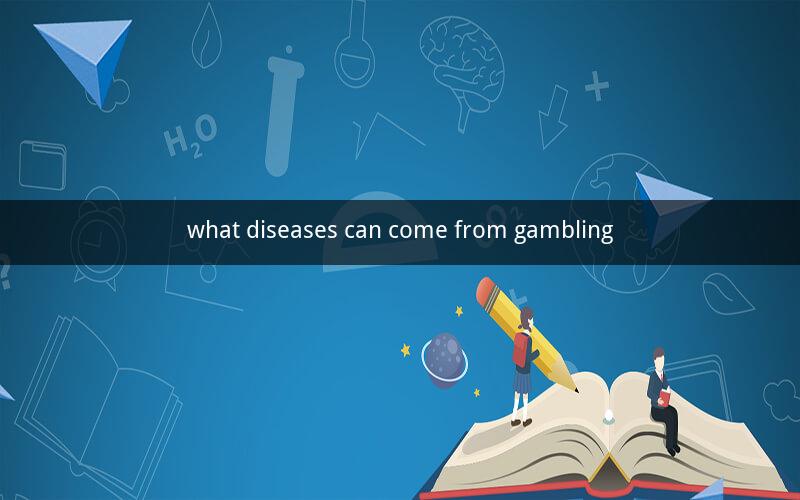
Directory
1. Introduction to Gambling-Related Diseases
2. Mental Health Disorders
3. Substance Abuse
4. Financial Problems
5. Family and Relationship Issues
6. Legal Consequences
7. Health Risks
8. Prevention and Treatment
9. The Impact of Gambling-Related Diseases on Society
10. Conclusion
1. Introduction to Gambling-Related Diseases
Gambling, a form of entertainment, has the potential to lead to various diseases and health issues. When individuals engage in excessive gambling, they may face a range of problems that can impact their physical, mental, and social well-being. This article explores the various diseases that can arise from gambling and the potential consequences of such behavior.
2. Mental Health Disorders
Gambling addiction, also known as pathological gambling, is a mental health disorder characterized by an uncontrollable urge to gamble, despite the negative consequences. Individuals with gambling addiction may experience symptoms such as:
- Preoccupation with gambling: Thoughts about gambling consume a significant portion of the individual's time and energy.
- Loss of control: Individuals find it difficult to stop gambling, even when they know it's causing harm.
- Relapse: After a period of abstinence, individuals may return to gambling and experience a recurrence of symptoms.
- Emotional and psychological distress: Individuals with gambling addiction may experience depression, anxiety, and other mental health issues.
3. Substance Abuse
Gambling addiction can lead to substance abuse as individuals may turn to alcohol or drugs to cope with the negative emotions associated with gambling. The combination of gambling and substance abuse can exacerbate the severity of both problems, leading to further health issues.
4. Financial Problems
Excessive gambling can lead to significant financial problems, including debt, bankruptcy, and the loss of savings. The stress of financial difficulties can contribute to mental health issues, such as depression and anxiety, and may also lead to other health problems.
5. Family and Relationship Issues
Gambling addiction can strain relationships with family and friends. Individuals with gambling addiction may lie about their gambling habits, steal money, or neglect their responsibilities, leading to trust issues and conflict. Divorce, separation, and estrangement are common consequences of gambling addiction.
6. Legal Consequences
Gambling-related crimes, such as fraud, theft, and embezzlement, can result from gambling addiction. Legal consequences can include fines, imprisonment, and a criminal record, which can further impact the individual's life and future opportunities.
7. Health Risks
Gambling addiction can lead to various health risks, including:
- Cardiovascular disease: Stress and anxiety associated with gambling can increase the risk of heart disease and stroke.
- Sleep disorders: Insomnia, fatigue, and disrupted sleep patterns are common in individuals with gambling addiction.
- Digestive problems: Stress can lead to gastrointestinal issues, such as heartburn, ulcers, and irritable bowel syndrome (IBS).
- Weakened immune system: Chronic stress can weaken the immune system, making individuals more susceptible to infections and diseases.
8. Prevention and Treatment
Preventing and treating gambling-related diseases involves several strategies:
- Education: Raising awareness about the risks of gambling addiction and its potential consequences.
- Self-help and support groups: Providing individuals with a platform to share their experiences and receive support.
- Therapy: Cognitive-behavioral therapy (CBT) and other therapeutic approaches can help individuals develop coping skills and address underlying issues.
- Financial management: Learning how to manage finances effectively and create a budget can help prevent gambling-related financial problems.
9. The Impact of Gambling-Related Diseases on Society
Gambling-related diseases have a significant impact on society, including:
- Economic burden: The cost of treating gambling addiction and dealing with the consequences of gambling-related problems can be substantial.
- Social impact: Divorce, separation, and family breakdown can lead to social isolation and contribute to a decrease in community cohesion.
- Public health: The health risks associated with gambling addiction can lead to an increased burden on public health systems.
10. Conclusion
Gambling, while a form of entertainment, can lead to a range of diseases and health issues. Recognizing the potential consequences of excessive gambling is crucial for individuals and society. By understanding the risks and seeking help when needed, individuals can prevent the development of gambling-related diseases and improve their overall well-being.
Questions and Answers
1. What is gambling addiction, and how does it affect mental health?
Gambling addiction, also known as pathological gambling, is a mental health disorder characterized by an uncontrollable urge to gamble, despite the negative consequences. It can lead to mental health issues such as depression, anxiety, and other psychological problems.
2. Can gambling addiction lead to substance abuse?
Yes, gambling addiction can lead to substance abuse as individuals may turn to alcohol or drugs to cope with the negative emotions associated with gambling.
3. How can excessive gambling affect financial stability?
Excessive gambling can lead to significant financial problems, including debt, bankruptcy, and the loss of savings.
4. What are some common legal consequences of gambling-related crimes?
Legal consequences of gambling-related crimes can include fines, imprisonment, and a criminal record.
5. How can gambling addiction impact family and relationships?
Gambling addiction can strain relationships with family and friends, leading to trust issues, conflict, and potential divorce or separation.
6. What health risks are associated with gambling addiction?
Gambling addiction can lead to various health risks, including cardiovascular disease, sleep disorders, digestive problems, and a weakened immune system.
7. What are some effective prevention strategies for gambling-related diseases?
Effective prevention strategies include education, self-help and support groups, therapy, and financial management.
8. How can individuals seek help for gambling addiction?
Individuals can seek help for gambling addiction through therapy, support groups, and other resources such as counseling services and helplines.
9. What is the role of society in addressing gambling-related diseases?
Society plays a crucial role in addressing gambling-related diseases by raising awareness, providing resources, and implementing policies to prevent and treat gambling addiction.
10. How can gambling-related diseases affect public health?
Gambling-related diseases can affect public health by increasing the burden on healthcare systems and contributing to social issues such as poverty and crime.